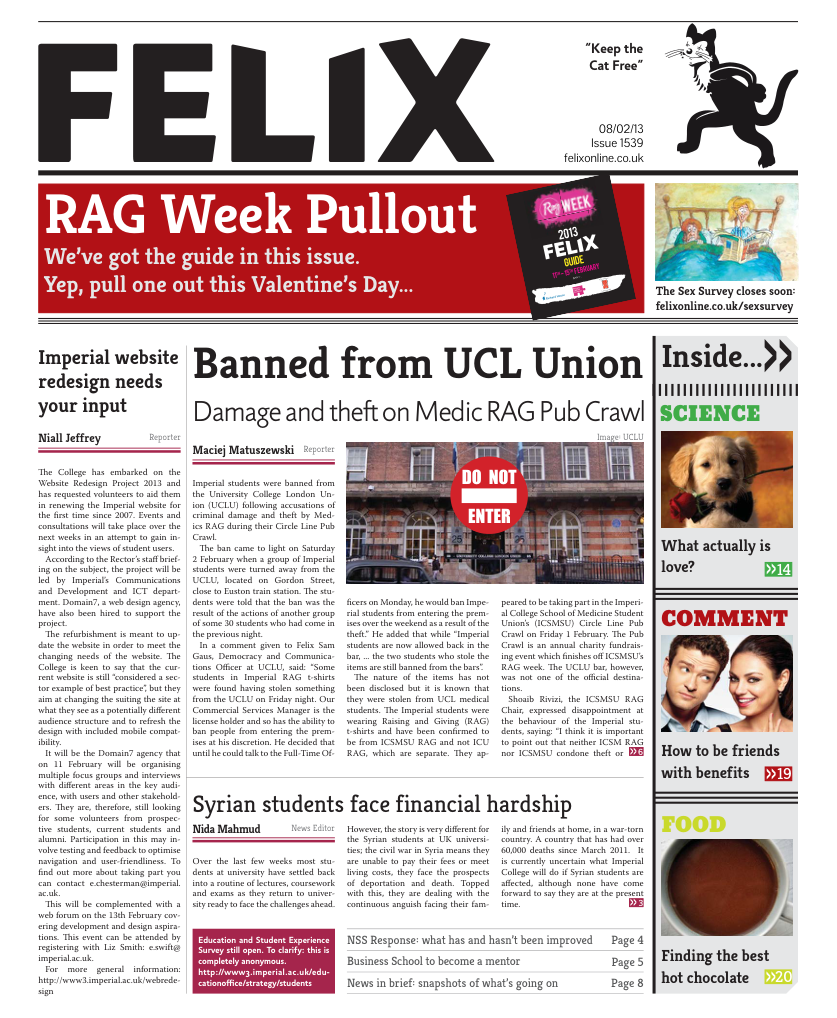Syrian students face financial hardship
Government urged to help those who face deportation to Syria if removed from courses

Over the last few weeks most students at university have settled back into a routine of lectures, coursework and exams as they return to university ready to face the challenges ahead. However, the story is very different for the Syrian students at UK universities; the civil war in Syria means they are unable to pay their fees or meet living costs, theyface the prospects of deportation and death. Topped with this, they are dealing with the continuous anguish facing their family and friends at home, in a war-torn country. A country that has had over 60,000 deaths since March 2011. It is currently uncertain what Imperial College will do if Syrian students are affected, although none have come forward to say they are at the present time.
The government has been urged to show clemency and help Syrian students who are at the risk of being ejected from their university and deported from the UK. There are approximately 670 Syrian students studying in the UK, approximately 80% are on postgraduate courses. The lack of funding means they face being removed from their courses. Mansour Shaeban, a former Computing student at Bolton was expelled last for not being able to receive money from his family to pay tuition. Many of these students were funded by Syria’s higher education ministry, which has ceased awarding grants. Other students have had their fees suspended for standing against the Syrian regime. The Syrian embassy in London processes the payments, but it has come to a halt, being left with just a skeleton of staff; furthermore, international sanctions are in place on the country’s banks. Consequently, self-funded students are unable to receive money from their family in Syria.
Last October, the UK Borders Agency announced temporary concessions for Syrian nationals, enabling visa extensions or the switching of visa categories without leaving the UK; however, this is yet to be addressed as these concessions will expire on 15 March. Many students currently face an uncertain future; some have had their student status suspended, while others will not be able to graduate till their fees have been paid. Without funding, many students are struggling to make ends meet for their living costs.
Liam Burns, President of the NUS, commented: “The situation in Syria is devastating enough without universities turning their backs on those currently studying in the UK. What we urgently need to see is every Syrian student is given support when finances aren’t forthcoming so they can continue their studies. This has to be the least the UK can do considering the tragic circumstances of the conflict in Syria.”

Imperial College London currently has ten students who have Syria listed as their primary citizenship. The International Office said that no students have approached them about the situation at this time. When asked about what the College would do to hep students, a College spokesperson said: “Any student who experiences an unexpected change in their financial circumstances, including tuition fees, can contact the Student Hub, the College Tutors or the Union’s Student Advice Centre for information and advice. The College Hardship Fund is also available to help students experiencing unexpected financial hardship. The Fund cannot be used to assist with tuition fee payment but can help with living costs. Students can find further information by visiting http://www3.imperial.ac.uk/studentfinance/currentstudents/hardshipfund.”
Avaaz, an online pressure group, have set up a petition demanding the Foreign Office assist Syrian students, as was done in 2011 for the Libyan students during the Libyan revolution. The petition currently has over 46,000 signatures. Avazz is appealing for the government ministers to step in: William Hague, the Foreign Secretary; Vince Cable, Minister for Business, Innovation and Skills; and David Willetts, Universities Minister, to ensure the Syrian students continue their studies in the UK. They have tracked many students who have been expelled from their courses, while there are others that could be expelled as they are unable to pay their fees. When removed from their courses, they run into difficulties with their visas and face deportation to war areas. If they have any connections to the opposition, they will be arrested on their return.
Luis Morago, the campaign director for Avaaz, commented: “The UK beats the drum for action on Syria but has done little to help hundreds of Syrian students in Britain who face being thrown off their courses. The UK government must intervene and ensure they can continue their studies in Britain.” Two weeks ago a statement was released from David Willetts, the universities minister, in association with the FCO and Treasury; he said that the government is working with the Universities UK Higher Education International Unit to identify ways to assist students. He said: “The government appreciates the potential challenges faced by students living in the UK who wish to receive money from countries that are subject to financial sanctions and looks favourably on licence applications to enable the financing of education. All applications are considered on a case by case basis and nationality is not a factor in any licensing decision. Syrian students within the UK wishing to receive money from or via a designated Syrian entity should apply to the Treasury by email for a licence, setting out the amount and purpose of the transaction as well as the individuals, organisations and banks involved.”
The British Council has set up a hardship fund to support the living costs to fund the 100 Syrian scholars who are studying in the UK on the main Syrian government scholarship. Certain universities are allowing the deferral of fees and providing support through hardship funds, allowing students to continue with their study. The Council for Assisting refugee Academics has been providing help to academics in danger for 80 years, has also launched an appeal to help academics facing hardship.
Christian Gilmore, a campaigner for the Syrian students, said “it is in the interest of the British government to help these people and to follow up in its commitment. They may not be able to solve the international problem right now but helping Syrian students is 100% in their control.








